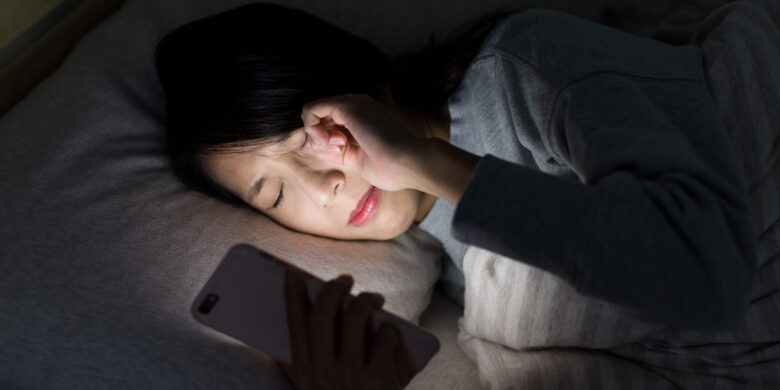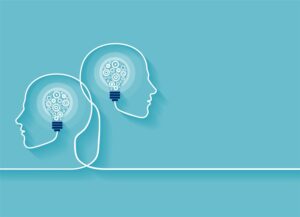Nowadays, screens are everywhere. Most of us are glued to our phones, tablets, computers, or televisions from the moment we wake up to the moment we go to sleep. Whether it’s working, reading, or just binge-watching your favorite show, screen time has become an integral part of our daily lives. But have you ever wondered how regular exposure to these environments could be affecting your sleep? Many studies have shown that spending too much time in front of a screen can lead to sleep problems. Long periods of screen staring can lead to insomnia or drowsiness, even after a restful night’s sleep. The good news is that the first step to better sleep is understanding how screen time affects your sleep. With a few small changes, you can get back to sleeping soundly and waking up refreshed.
The Facts About Screens and Sleep:
The blue light emitted by screens is so intense that it can change the way your brain works. Melatonin is a hormone that regulates sleep. Blue light can alter the amount of this hormone released. When you see blue light, you trick your brain into thinking it’s still daytime, especially at night. This procedure makes it take longer for your body to produce melatonin, making it harder to fall asleep. In addition to making it harder to fall asleep, blue light can disrupt your body’s natural circadian rhythm, which tells you when to go to sleep and when to wake up. If your circadian rhythm is disrupted, you may have trouble falling asleep at night and feel alert when you wake up during the day.
In addition, reading exciting news, playing action games, or watching drama series before bed can make your brain too busy when it should be relaxing. Answering emails or text messages can cause your brain to go into work mode instead of rest mode. Blue light and mental stimulation can make your bed feel more like a workspace than a resting place. Understanding these effects will help you understand how damaging evening screen time can be to your overall sleep health.
Screen Time and Its Impact on Different Age Groups:
Not everyone experiences the same impact from screen time. Young people and children are particularly at risk. Their brains and sleep cycles are still developing, and spending too much time on the computer can be harmful. Teenagers and children who use electronic products late at night are more likely to have sleep problems, poor academic performance, and even behavioral disorders. As eyes grow, they become more sensitive to blue light, which intensifies the melatonin-lowering effect. These changes can lead to less deep sleep, more nighttime awakenings, and less sleep.
Teenagers often stay up late chatting with friends or browsing social media, which takes longer to fall asleep and results in poorer sleep quality. They stay connected because they don’t want to miss out (FOMO), and the notifications never stop. Adults are also vulnerable. It’s easy to lose track of time and put off going to bed, whether it’s because work-related emails come in late at night or you’re binge-watching streaming services. You can lose hours of sleep just thinking about ‘it’s happening again.’ The problem can be worse for older people, as their sleep naturally becomes shallower and more fragmented as they get older. This makes the problems caused by screens more noticeable.
Signs That Excessive Screen Use Is Causing Sleep Problems:
It’s not always obvious whether the time you spend in front of a screen is affecting your sleep. You might not immediately see the connection between watching Netflix in the evening and feeling sleepy the next morning. However, there are a few things to be aware of. Avoid delaying falling asleep for more than 30 minutes after hitting the bed. That’s a terrible sign. This could be due to the constant stimulation from screens. Another warning sign is waking up several times a night or feeling worn out in the morning, even if you only slept 7–8 hours.
If you need coffee to stay awake during the day, this could also be a sign. Too much computer time can also lead to poor sleep quality, which can alter your mood and lead to anger, increased stress, and even depression. This symptom indicates an imbalance in your circadian rhythm, causing you to feel more awake at night and less alert during the day. To resolve this problem, you first need to recognize the signs. Once you understand how your computer is affecting the quality of your sleep, you can adjust your habits to get better sleep again.
Simple Ways to Reduce Screen Time Before Bed:
Want to sleep better? The positive news is that you don’t have to give up all your computers. This approach should help you become more aware of how you’re managing your habits. One of the best ways to fall asleep is to turn off all computers at least an hour before bed. The process gives your brain a chance to relax and produce its own melatonin. If you have to use your device at night, try turning on a blue light filter or night mode. These reduce the amount of blue light they emit.
It can also help to create a screen-free routine before bed. Reading a real book, taking a warm bath, doing some simple stretches, or meditating can help. When you do this, your brain knows it’s time to slow down and prepare for rest. Another effective method is to keep screens away from your bedroom. Avoid endless scrolling in bed by charging your phone in another room or setting an old-fashioned alarm clock.
Finally, consistency is key. Your body’s normal sleep-wake cycle functions better if you go to bed and wake up at the same time every day, even on weekends. These simple but helpful changes can have a big impact on your sleep quality and overall health.
Conclusion:
Today, screen time is one of the most common factors that prevent us from getting the rest we need. The bright lights of our devices and constant excitement can seriously disrupt the body’s natural processes that help us get deep, restful sleep. It happens to everyone, both children and adults. The good news is that there are several ways to tackle this problem. Being aware of your habits, limiting screen time, and developing a relaxing bedtime routine can be helpful. With a few smart changes, you can protect your sleep, improve your health, and feel more refreshed every day. Falling asleep doesn’t have to be difficult; all you have to do is put your gadgets away.
FAQs:
1. How long should you be on the computer before bed?
If you’re on the computer an hour before bed, it can be harder to fall asleep. It’s best to take a break from everything during this time so that your mind has time to relax.
2. Are blue light-blocking glasses helpful for people who have trouble sleeping?
Yes, blue light-blocking glasses can help. If you have to use screens at night, they can help you fall asleep more easily because they block out the blue light.
3. Can prolonged computer use cause insomnia?
Prolonged screen use, especially at night, can make it take longer to fall asleep and disrupt your body’s normal sleep cycle, making insomnia worse.
4. Does reading on your Kindle keep you awake?
It varies by model. A Kindle with a blue light backlight will still affect your melatonin levels, but you’re less likely to wake up from the e-ink screen.
5. Besides playing video games, what else should you do before bed?
Some good, non-digital ways to relax include reading, writing in a notebook, doing light yoga, or listening to relaxing music.




